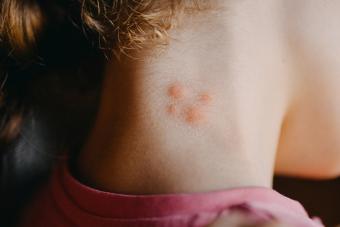
Are you wondering how do you treat insect bites and stings? There are many remedies available depending on your symptoms and what insect caused the bite or sting.
How Do You Treat Insect Bites and Stings
If you happen to get stung or bitten by an insect, the most important thing to do is act quickly. The first thing that you will want to do is to wash the bite or sting area with soap and water. To reduce the risk of infection, apply an antibiotic ointment.
Wasps and bees have stingers that they use to inject venom into the skin. If a stinger from one of these insects is present in the skin, use a straight edge, such as a credit card or flat edge of a butter knife, to scrape away the stinger. Do not squeeze to get the stinger out or you will release more venom into your system and will make the sting worse.
If you encounter a yellow jacket, get away from it as quickly as possible, since, unlike bees or wasps, yellow jackets can keep stinging repeatedly. They do not leave stingers.
Treating bites and stings is usually done by taking care of the bothersome symptoms that occur. Common symptoms include:
- Swelling
- Inflammation
- Pain
- Redness
- Itching
Reduce Swelling and Inflammation
To reduce swelling and inflammation from an insect bite or sting, you can apply ice or a cool compress to the affected area. Some home remedies to try:
- Apply a paste of baking soda and water to reduce swelling.
- Soak in a bath with Epsom salts to reduce pain and swelling.
- A mixture of mud and water can be made into a paste and applied to the sting site. Keep it covered until it dries.
Ease Itching and Pain
Itching can be one of the most bothersome symptoms of an insect bite or sting. You can take an over-the-counter antihistamine, such as Benadryl, to relieve itching and a pain reliever such as ibuprofen to relieve pain. A lotion such as Calamine may be applied to the bite to help with itching as well. One important thing to remember is to try not scratching the bite or sting area. Scratching will only cause more irritation to the skin.Some home remedies to try for itching:
- Soak in an oatmeal bath
- Dab ammonia on the area
- Rubbing alcohol or vinegar applied to the area
When to Seek Medical Attention
If you have a history of severe allergic reactions to bites or stings, be sure to always carry your anaphylaxis kit. It is also important to watch for signs of an infection or severe allergic reaction from the bite or sting. Signs include:
- Fever
- Swelling
- Chest pain
- Anxiety
- Shortness of breath
- Dizziness
- Hives
- Vomiting
Final Thoughts
Prevention is the key. Wear an insect repellent when going outdoors during the hot summer months, especially in the evenings. You can also wear protective clothing, such as long sleeves or pants, if going hiking or camping. Wearing light colored clothing is another way to prevent insects as well as staying away from perfumes, scented lotions or soaps that will attract insects.







